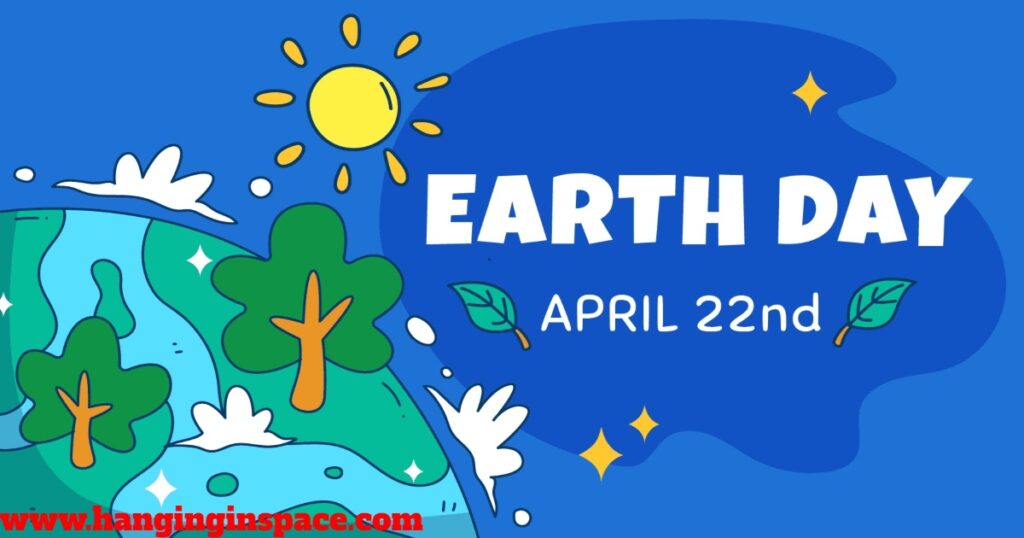Earth Day is celebrated every year on April 22nd, People around the world come together to celebrate Earth Day. It is a global event dedicated to promoting environmental protection and sustainability.
Since its inception in 1970, Earth Day has grown into one of the largest civic observances worldwide. It unites individuals, communities, and organizations in a shared commitment to save our planet Earth for future generations. The main slogans of Earth Day are “Save Our Planet”, “Save Planet Earth” and “Save Earth”.

What are the Ways to participate in Earth Day?
There are several ways to participate in Earth Day.
1. Plant Trees:
Tree planting events provide an excellent opportunity to combat deforestation and promote reforestation efforts. By organizing or participating in such events within your community, you can contribute to the restoration of ecosystems, enhance biodiversity, and mitigate climate change.
2. Volunteer for Environmental Projects:
Many organizations, including nonprofits, schools, and government agencies, host volunteer opportunities for Earth Day. You can volunteer for activities like beach cleanups, habitat restoration projects, or community gardening initiatives.
3. Reduce, Reuse, Recycle:
Practice waste reduction and recycling in your daily life. Reduce single-use plastics, reuse items whenever possible, and recycle materials like paper, plastics, and glass.
4. Support Sustainable Practices:
Choose environmentally-friendly products and support businesses that prioritize sustainability and ethical practices. Look for eco-friendly alternatives, such as reusable shopping bags, biodegradable cleaning products, and energy-efficient appliances.
5. Advocate for Environmental Policies:
Contact elected officials and advocate for policies that protect the environment and address pressing issues like climate change, pollution, and habitat destruction. Join environmental organizations or sign petitions supporting conservation efforts.
6. Educate Yourself and Others:
Learn about environmental issues and share information with friends, family, and colleagues. Host educational events or workshops to raise awareness about environmental challenges and promote sustainable solutions.
7. Connect with Nature:
Appreciate the beauty of the natural world. Take a hike, visit a local park, or participate in nature-based activities like birdwatching or gardening. Connecting with nature fosters a deeper appreciation for the environment and inspires a desire to protect it.
8. Support Environmental Initiatives:
Donate to environmental organizations or participate in fundraising campaigns to support conservation efforts and sustainability projects. Your contributions can help fund research, advocacy, and on-the-ground conservation work.
9. Reduce Your Carbon Footprint:
Take steps to reduce your carbon footprint by conserving energy, using public transportation or carpooling, and supporting renewable energy initiatives. These small changes in your lifestyle can have a positive impact on the environment.
10. Celebrate Earth Day Every Day:
Earth Day is not just a one-day event. It’s a mindset and a commitment to environmental stewardship. Incorporate sustainable practices into your daily life and continue to advocate for a healthier planet throughout the year.
Mother Earth Wellness:
Earth is our mother planet. Earth’s protection is our responsibility. Mother Earth Wellness is an important thing to work on. We all should work for the wellness of Mother Earth. The important steps for the wellness of Mother Earth are:
Ecological Protection:
This term highlights safeguarding the natural world, including plants, animals, and ecosystems.
Planetary Health:
This broader term encompasses the health of human societies and the natural world we depend on.
What are the Origins of Earth Day?
The origins of Earth Day trace back to 1970 when U.S. Senator Gaylord Nelson took the initiative to raise awareness about environmental issues. Senator Nelson was deeply concerned about the growing environmental degradation caused by pollution, deforestation, and other human activities.
He recognized the need for a coordinated national response. On April 22, 1970, he organized the first Earth Day, mobilizing millions of people across the United States to participate in rallies and other events aimed at raising awareness about environmental issues and advocating for change.
The inaugural Earth Day was a resounding success, attracting widespread media coverage and prompting government and industry leaders to take notice. It served as a wake-up call to the nation, igniting a wave of environmental activism and prompting decisive action at the federal level.
In the wake of Earth Day 1970, the U.S. Congress established the Environmental Protection Agency (EPA) to oversee federal environmental regulations and enforcement. Earth Day played an important role in the passage of landmark environmental legislation, including the Clean Water Act, Clean Air Act, and Endangered Species Act, which laid the foundation for modern environmental policy in the United States.

What is the Global Impact of Earth Day?
Earth Day has evolved into a powerful movement that transcends geographical boundaries and inspires action on a wide range of environmental issues. Since its inception in 1970, Earth Day has grown into an annual event celebrated by millions of people in countries around the world.
It provides a platform for raising awareness about pressing environmental challenges, including climate change, biodiversity loss, pollution, and resource depletion, and promotes dialogue and collaboration to address these issues effectively.
One of the most significant aspects of Earth Day is its inclusivity and accessibility, engaging people of all ages, backgrounds, and walks of life in environmental activism and advocacy. From students and educators to activists and policymakers, Earth Day inspires people from diverse backgrounds to take meaningful action to protect the planet.
Each year, thousands of events and activities are organized in communities worldwide to commemorate Earth Day. These range from tree plantings and beach cleanups to educational workshops and advocacy campaigns, engaging participants in hands-on conservation efforts and empowering them to make a positive impact in their local environments.
What is the Significance of Earth Day?
Earth is the unique planet in the entire universe, its ecosystem and unique atmosphere allow the existence of life. We should take care of this planet and protect it.
The significance of Earth Day lies in its role as a powerful reminder of our interconnectedness with the natural world and our shared responsibility to protect and preserve it. In today’s increasingly industrialized world, it’s easy to lose sight of the essential role that the environment plays in sustaining life on Earth.
Earth Day serves as a wake-up call, prompting us to recognize and appreciate the value of nature and the urgent need to safeguard it for future generations.
It empowers individuals and communities to take meaningful steps toward sustainability in their daily lives, whether through simple lifestyle changes, community engagement, or advocacy efforts.
By raising awareness of pressing environmental challenges, such as climate change, pollution, deforestation, and habitat destruction, Earth Day motivates people to become proactive stewards of the environment.
One of the most significant aspects of Earth Day is its emphasis on solutions-oriented approaches to environmental issues. Rather than dwelling solely on the problems facing our planet, Earth Day encourages us to focus on actionable solutions and positive initiatives that can make a real difference.
Whether it’s supporting renewable energy projects, advocating for environmental policies, participating in conservation efforts, or promoting sustainable practices in our workplaces and communities, Earth Day inspires collective action and underscores the importance of taking responsibility for our impact on the planet.
Earth Day Quiz:
You can participate in the Earth Day quiz and increase your knowledge of how to protect the Earth:
Earth Day Network Quizzes:
The official Earth Day website (https://www.earthday.org/) has a variety of quizzes on environmental topics like climate change, plastic pollution, and sustainable living. These quizzes can be a great way to learn more about the Earth and the challenges it faces.
Google Earth Day Quiz:
One of the most popular online activities is available by clicking on this year’s Earth Day logo on Google (or Googling for “Google Earth Day Quiz”). It’s a personality test that is 100% correct and completely scientific.
Conclusion:
In conclusion, Earth Day serves as a powerful reminder of the importance of environmental stewardship and collective action in addressing the urgent challenges facing our planet. By coming together to celebrate Earth Day and taking concrete steps to protect and preserve the environment, we can create a more sustainable and resilient future for all life on Earth.
As we commemorate Earth Day each year, let us renew our commitment to caring for our planet and working towards a greener, healthier, and more equitable world.
